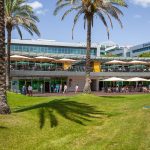ONE Shipping Portugal – Successfully navigating rough economic seas
This year has seen rough seas so far for Europe’s container shipping sector with 11% or a total 302 shippings cancelled in May on all the main line trades according to maritime intelligence company eeSea. But how has ONE Ocean Network Express, which has a vigorous presence in the Portuguese market, been steering a choppy market?
Text Chris Graeme
Photos: ONE Shipping
Covid-19 has had an impact on global shipping. Bearing in mind that the first cases of Covid-19 emerged in December 2019, the report ‘Covid-19 impacts on Global Container Shipping Trade’ by Maritime intelligence company eeSea showed that the pandemic had seriously impacted global shipping container capacity.
To date, a total of 1,675 sailings have been cancelled, or 11%; which comes out at 13% for shipping groups 2M, 17% for the Far East’s Ocean Alliance and 17% for THE Alliance, while only 8% of non-alliance sailings have been cancelled.
Essential Business spoke to Shunichiro Mizukami, the Managing Director of ONE Europe and Africa who says that despite the crisis ONE has effectively managed its container fleet to ensure that customer needs continue to be met.
“There are continuing challenges to all shipping operators and logistic partners, as a result of COVID -19. A downturn in global trade means a reduction in booking demand, together with quarantines, lock downs and ensuring all our colleagues and business partners are able to operate safely with minimal risk whilst providing a reliable service to our customers is certainly a challenge. But, ONE and its business partners are dedicated to keeping the logistics chain moving, delivering your everyday, in times of crisis,” explains Shunichiro Mizukami.
“While we cannot foresee the future, ONE is following the situation closely and preparing for the market to pick up so that we are well positioned for the future and can continue to meet our customers’ needs,” he adds.
The company says that the end of 2019 and the beginning of this year saw a smooth transition to low sulphur fuel to meet IM02020 regulations.
“We also succeeded in quickly adjusting our network to meet customer requirements. When COVID-19 broke out, we immediately activated our Business Continuity Plan all around the world. When the company was created, a key objective was to enable remote access to our systems anywhere in the world. Therefore, as countries imposed quarantines, we were able to continue working seamlessly. I hope that our customers benefitted from our flexibility and efficiency” he says.
Shunichiro Mizukami believes the shipping industry is very resilient and used to adapting to the market, whether adapting to meet new international regulations such as IMO 2020, or disruption to China and US trade activity, ONE has been able to flex its services in the market.
“The formation of ONE two years ago from its merger of K-Line, NYK and MOL liner business has meant we have successfully increased network and service coverage and this has put us in a strong position to compete in a more consolidated industry”.
ONE Shipping Portugal used to be called K-Line Portugal and further back in time Garland. “Garland is a long-trusted partner in Portugal for one of our legacy companies. The trust and friendship have been smoothly integrated into ONE Portugal, the new joint venture between ONE and Garland,” notes Shunichiro Mizukami.
Best in Class
Despite Covid-19 ONE Shipping Portugal has retained its strategy in Europe to be one of the ‘Best in Class’ carriers.
“ONE is not aiming to the join mega carriers of the industry, but we would like to be one of the ‘Best in Class’ in Europe and Portugal, sailing along with our customers as their trusted partner. As a part of our roadmap, ONE has been and will continue to enhance digitalisation to improve service quality and customer user experience”.
ONE Shipping in Portugal operates services from the ports of Leixões (Porto) and Lisbon to Rotterdam.
Through its partner Garland which offers Sea Freight forwarding services to and from Iberia to world-wide destinations, last year saw 257,700 TEUS shipped equating to 9,656,000 Sea Freight tons.
Whilst ONE Shipping does not provide a breakdown for the financial results on its Portuguese-Europe stretch, ONE enjoyed a profitable year by the end of 2019 after posting three consecutive quarters with a positive result. It was the first annual profit since the carrier began operations in 2017.
ONE’s FY third-quarter earning from October to December show the carrier just managed to remain in profit by US$5 million and profits grew US$121 million in the second quarter.
Mergers
In April 2018 the Japanese shipping companies Kawasaki Kisen Kaisha (“K” Line), Mitsui O.S.K. Lines (MOL) and Nippon Yusen Kabushiki Kaisha (NYK) merged to create Ocean Network Express (ONE). This made ONE the sixth largest container shipping company in the world with over 250 ships and a capacity of 1,563,000 TEUS, with a market share of 7.1%.
As a result of this ambition, ONE Europe set up commercial companies in strategic places around the world including Portugal and it was within this context that ONE Shipping Portugal was founded.
The Garland Group, which had already been a partner of “K” Line Portugal, was selected to participate in the ONE joint venture in Portugal, “being obviously extremely proud to feel that our success over various years with “K” Line had been recognised internationally and would be continued,” as Mark Dawson the director of the Shipping area at Garland said at the time.
Since 2018 ONE increased the ships working for IBESCO (Iberia, Europe & Scandinavia loop) to over 1000 TEUs of capacity, corresponding to 40% growth with a major focus on the Portuguese market.
Port modernisation and instability
Portugal as a market has not been without its problems in recent years, largely due to port worker union run-ins with the Portuguese Government over pay, contracts and working conditions which resulted in stevedores downing tools and going on strike.
The most recent case in March involved the union SEAL (Union of Stevedores and Logistics Activity) which prolonged its strike at the Port of Lisbon to mid-April against “collective layoffs” but was only the latest in a long string of disruptions stretching back to 2016 and before largely over union insistence on maintaining collective contracts which port operators at both Lisbon and Porto say are economically unviable, alleging that they are “totally maladjusted to the reality of losses in cargo and clients since 2016.”
“Industrial disputes have an impact on the competitiveness of ports. The port of Leixões has benefited from labour stability and consequently is seeing its movement grow steadily over the past few years. The industrial actions in Lisbon have created a less favourable image of the port. It would be desirable for these disputes to be resolved, thus allowing shipping lines and the market to regain confidence in this port,” says Shunichiro Mizukami.
On the positive side, the Portuguese Government has made considerable strides in modernising and expanding Portugal’s ports as part of a long-term investment plan which began in 1997 with investment and modernisations programmes at all five ports in order to make them more able to compete within a international context after years of decay and decline through the 1980s and most of the 1990s.
This also includes ambitious plans to invest heavily in the Port of Sines near Setúbal south of Lisbon, making it one of the largest and most modern ports in Europe, with transatlantic connections between Europe and the United States and a proposed high-speed freight rail link to Madrid and France.
This involved changing the business model from the existing Tool Port to Landlord Port with a simplification of processes, namely by cutting red tape via the introduction of the Single Port Invoice and the Unique Port Window and Unique Logistics Window.
“Twenty years on the Government doesn’t see any reason not to now look at the ports and the way the port authorities work in another way, making them more agile, capable of cooperating with other agents, making them more competitive and profitable in service to the national economy” says José António Contradanças, an economist and advisor to the company Sines Port Authority Administration (Administração do Porto de Sines, S.A.).
“Port infrastructures must effectively modernise and adapt to market changes. The two ports where we operate, namely Leixões and Lisbon, have projects to expand and modernise their structures, which has already partially taken place. When the works are finished there will be many more facilities available to port stakeholders and all will benefit from the improvements” concludes Shunichiro Mizukami, the Managing Director of ONE Europe and Africa.










